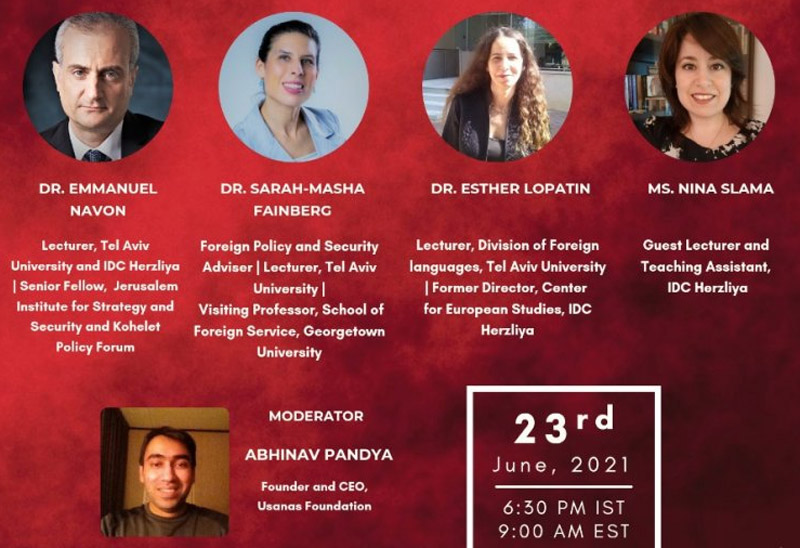 Israel Foreign Policy
Israel Foreign Policy Israeli scholars highlight emerging contours of Israel’s ‘periphery doctrine' at webinar
Israeli scholars at a recent webinar organised by India-based security affairs think tank Usanas Foundation said the "periphery doctrine" followed by the Jewish nation once now has completely reshaped with the normalisation of relations with the erstwhile enemy countries of the Middle East, driven by today's geopolitics and energy politics in the region.
Israel's "Periphery Doctrine" advanced by Israel’s first Prime Minister David Ben-Gurion, was a foreign policy strategy that saw Israel develop close strategic alliances with non-Arab Muslim states in the Middle East (read Turkey and pre-revolution Iran) to ward off the united opposition of Arab states to the very existence of Israel.
Speaking at the webinar, Emmanuel Navon, International Relations expert and lecturer at Tel Aviv University, contextualized Israel’s strategy of the periphery in historical perspective.
“Israel’s international standing has never been this good,” he said while expanding on Israel’s evolving diplomatic posture and normalisation of relations with Middle Eastern countries in recent years.
He attributes this to former Israeli Prime Minister Ben Gurion’s “out of the box thinking” and “establishing alliances with countries in the wider Middle East” based on the principle of “the enemy of my enemy is my friend.”
He argues that this idea not only continues to have relevance but has gained momentum as “new alliances (have emerged) around Israel vis-à-vis Iran and Turkey.”
He attributed this “complete reshaping of regional alliances” to not only geopolitics but also the energy politics in the region.
“If in the 1960s it was a periphery together with Iran and Turkey against the Arab world, today it is a periphery with the Arab world and other allies such as Azerbaijan and Greece against Iran and Turkey,” he said while commenting on the changes in Israel’s peripheral diplomacy.
Panelists Dr. Sarah-Masha Fainberg—also a lecturer at Tel Aviv University and visiting professor at School of Foreign Services, Georgetown University—addressed the thorny question of Israel-US-Russia relationship and the implications of Russia’s military presence in the Middle East for Israel.
Acknowledging that the United States is Israel’s “only one strategic ally which neither Russia nor China can replace” she clarified that “Russia is not an enemy.”
“At the bilateral level ties between Russia and Israel are thriving…yet from a regional perspective, they grapple with irreversible disagreements on issues that each side see as crucial, critical to its own national security interest and power projection, namely Iran, nuclear ballistic regional, Syria and Palestinian question,” she said while highlighting the “paradox” in Russia-Israel relations.
“Russia would be the only power to mitigate and act as a backchannel communication between Hezbollah and Israel” she said, which makes ties between the two countries vital.
In this sense she believes “Russia, from an Israeli perspective represents in a way an opportunity” which could have represented a “major challenge” had it limited Israel’s strategy in Syria.
“The U.S. is happy to use this (Israel-Russia) relationship as a backchannel communication, when needed,” she added.
Nina Slama, Guest Lecturer, and Teaching Assistant IDC Herzliya—provided a historic overview of the evolution of India-Israel ties against the backdrop of the international context of Cold War and Post-Cold War geopolitics.
She highlighted how Israel has proved to be a “true friend through thick and thin”—be it providing assistance during the Kargil war of 1999 or supporting India in international space during the 1998 backlash after the Pokhran-II nuclear tests.

“When Prime Minister Modi came to power, we could see that the relations not only became better and strategic, but also very close and personal,” she said.
New opportunities for India and Israel are abound with the new government in Israel which will “not be limited to military” but “extend into multiple domains such as culture, academic, innovation, water management and so forth.”
Another critical question addressed by the panel was concerning the influence of China in Israel. Abhinav Pandya, Founder and CEO of Usanas Foundation, who moderated the event highlighted how Chinese revisionist agenda is hurting Israel’s “two best friends—India and U.S.A” and why therefore a global resistance by liberal democracies such as Israel is imperative.
Dr. Sarah-Masha Fainberg contextualized Israeli relations with China by highlighting how despite strong trade and economic ties with Beijing, Israel too is wary of China’s intentions and its support to Israel’s enemies.
According to her, Israel has been dealing with China tactfully by harnessing leverage as was evident when Israel supported Canada and other powers' joint statement on the Xinjiang province question.
“Israel needs to establish leverages for itself which could have influence over China, which it is trying to do at the moment,” she said.
The discussion revealed how Israel is emerging as the key to the stability of the Middle Eastand acting as a balancing power to contain Iran. It has come a long way from its international isolation to playing a proactive role in regional and international geopolitics.
Israel’s technological prowess is proving to be its ultimate leverage that no country—be it Russia, China, Saudi Arabia or Iran—can match or risk offending.

Meanwhile, to mark the completion of one year of establishing Usanas Foundation, board member Ambassador Anil Trigunayat inaugurated the organisation’s “2020-2021 Annual Report” and congratulated founder and CEO, Abhinav Pandya, and his team for their extraordinary accomplishments in a short span of one year through quality research, policy recommendations and human rights advocacy.
Advisory board members,C.D. Sahay, distinguished fellow at Vivekananda International Foundation, former secretary (Research and Analysis Wing) and Kishan Verma, former Director Aviation Research Centre and Special Secretary of the Government of India were also present and gave their congratulatory remarks.
Support Our Journalism
We cannot do without you.. your contribution supports unbiased journalism
IBNS is not driven by any ism- not wokeism, not racism, not skewed secularism, not hyper right-wing or left liberal ideals, nor by any hardline religious beliefs or hyper nationalism. We want to serve you good old objective news, as they are. We do not judge or preach. We let people decide for themselves. We only try to present factual and well-sourced news.







